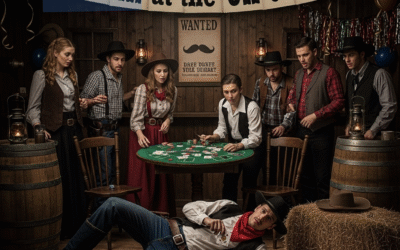The Problem Every Mystery Host Dreads
Picture this: you’ve set the stage perfectly. Costumes are on point, the decorations look like something straight out of The Emerald Expedition, and your playlist is pulsing with jungle drums or 1930s swing. Then it happens. That one guest—the wild card—decides the rules don’t apply to them. Instead of being a suspicious archaeologist, they’re cracking dad jokes about Wi-Fi in the jungle. Instead of delivering their lines as a glamorous movie starlet, they’re quoting memes.
Every host runs into this. The question is: how do you handle it without killing the fun?
Side Note: If you noticed the picture… Spoiler: YES, we are working on a Wizard-Themed Mystery!
Step 1: Set the Tone Before the Game Begins
A lot of “that one guest” issues come down to unclear expectations. When you hand out character packets, make it clear that the goal is immersion. You don’t need Broadway performances, but staying in character keeps the night fun for everyone.
If you’re hosting The Grand Gilded Express, you can even tell guests that the mystery works best when everyone leans into their roles. Let them know costumes are encouraged, accents optional, and staying in character highly recommended. Setting the stage here prevents most derailments later.
Step 2: Redirect with Humor
If a guest goes off the rails, don’t confront them like a middle school principal. Use humor to nudge them back. For example:
– If someone cracks a modern joke in the Wild West, have another character say, “What in tarnation is a TikTok? Sounds like a snake to me!”
– If someone breaks the mood on a train mystery, another player could whisper, “Careful, stranger, folks who talk like that don’t last long on the tracks.”
– If they keep at it, just double down: “You’re talkin’ crazy, pal. Crazy enough to kill?!”
By redirecting in character, you protect the game’s immersion without embarrassing your guest.
Step 3: Give Them Spotlight Moments
Sometimes the out-of-character behavior is really just attention-seeking. If you sense that, find ways to give them spotlight time—within the rules of the game. Assign them a piece of evidence to reveal, or let them take the lead in reading a dramatic clue.
In our Murder at Copper Gulch kit, for example, you could hand them the lantern evidence or have them step up for a dramatic monologue when accusations fly. Giving them structured moments to shine keeps them from stealing scenes in the wrong way.
Step 4: Use Peer Pressure to Your Advantage
Mystery games thrive on group energy. If one guest keeps breaking character, the others will naturally want the fun back on track. Encourage your other players to role-play their reactions:
– “I reckon this feller’s talkin’ mighty strange for someone in Copper Gulch.”
– “Professor, you seem… confused. Perhaps the jungle heat has gotten to you?”
The group’s collective commitment can gently pull the stray guest back into line.
Step 5: Remember—It’s Still a Party
At the end of the day, your murder mystery night is about laughter and memories. If one guest refuses to play along, don’t let it derail the evening. Adjust the energy. Let the committed players drive the story. Hand “that one guest” smaller but still useful roles so the game doesn’t hinge on their performance.
And most importantly—don’t stress. As long as the rest of the group is having fun, the mystery will still land. You might even laugh about it later: “Remember when Steve tried to be a space cowboy in the 1930s train mystery?”
The Secret Weapon: Structure
The real solution to “that one guest” is giving players clear roles, evidence, and objectives. A well-written mystery doesn’t leave much room for guests to wander off course. That’s why Megan’s Mysteries kits are designed with step-by-step instructions, character envelopes, and built-in reveals.
When everyone has a mission, even the class clown gets swept up in the story.
Final Thoughts
Handling “that one guest” comes down to prep, humor, and flexibility. Set expectations early. Redirect with playful in-character lines. Give spotlight time when needed. Let the group energy do its work. And remember—it’s still a party, not a Broadway audition.
With the right mystery kit and a little hosting savvy, even your most unpredictable guest can become part of the fun instead of the problem.
Ready to host a night where every player—yes, even *that* one—gets drawn into the drama? Explore our full lineup of mysteries, from jungle adventures to 1930s train intrigue, and see how structured storytelling turns chaos into magic.




0 Comments